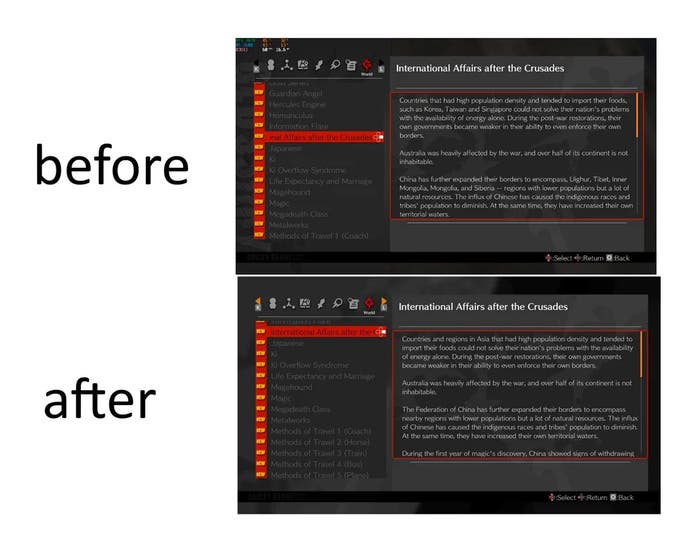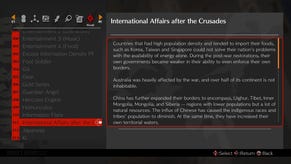Guilty Gear Strive stealth patches out mention of Uyghur, Tibet and Taiwan in China-related lore entry
Neither publisher or developer have issued comment.
A Guilty Gear Strive patch stealth removed reference to Uyghur, Tibet and Taiwan in a China-related lore entry.
The change was highlighted on the ResetEra forum on 21st June after it bubbled up on Strive's Steam forum following a patch issued on 18th June that brought Strive up to v1.03.
Neither Guilty Gear Strive publisher Bandai Namco or developer Arc System Works have commented, despite repeated requests from Eurogamer after the change emerged.
Strive includes an in-game glossary, which itself includes a large number of lore entries to help players understand its convoluted backstory.
The lore entry in question, "International affairs after the Crusades", originally mentioned Korea, Taiwan and Singapore, and Uygher, Tibet, Inner Mongolia, Mongolia and Siberia in its text.
Two sentences were altered. Here's the first in original form:
"Countries that had high population density and tended to import their foods, such as Korea, Taiwan and Singapore could not solve their nation's problems with the availability of energy alone."
This has become:
"Countries that had high population density and tended to import their foods could not solve their nation's problems with the availability of energy alone."
The second sentence in question was originally:
"China has further expanded their borders to encompass Uygher, Tibet, Inner Mongolia, Mongolia and Siberia - regions with lower populations but a lot of natural resources."
This has now become:
"The Federation of China has further expanded their borders to encompass nearby regions with lower populations but a lot of natural resources."

Without comment from publisher or developer it's impossible to know the true reason for the change, but many have suggested it was influenced by the Chinese market.
As Chris Tapsell reported as part of Eurogamer's sweeping investigation, Video games in China: beyond the great firewall, under Chinese law, video games can't contain anything that "threatens China's national unity, sovereignty, or territorial integrity", harm "the nation's reputation, security or interests" or include anything that "harms public ethics" or China's "culture and traditions".
Why these countries specifically? China has been accused of committing crimes against humanity and possibly genocide against the Uyghur population. China has also been accused of "coercing" hundreds of thousands of people in Tibet into military-style training centres. And the Chinese government sees Taiwan as a breakaway province that will, eventually, be part of the country again, whereas many Taiwanese disagree.
It is the latest in a string of recent events that have highlighted the growing influence of the Chinese market on video games.
Superb horror game Devotion, from Taiwanese developer Red Candle Games, only recently returned to sale digitally after it was delisted in 2019 when it was found to contain an unflattering reference to China's president, Xi Jinping.
In October 2019, Blizzard Entertainment was heavily criticised after it suspended pro Hearthstone player Chung "Blitzchung" Ng Wai for voicing Hong Kong support in a competition.
In 2020, Animal Crossing New Horizons was banned in China after it became a haven for Hong Kong protesters. Players used it to host pro-Hong Kong signs and share designs for anti-Chinese protest clothing.
In October last year, Chinese megahit Genshin Impact censored a number of words, including Taiwan and Hong Kong, in its chat.
And in February, Capcom replaced a Hong Kong flag with the China flag in Capcom Arcade Stadium's version of Super Street Fighter 2 Turbo.









